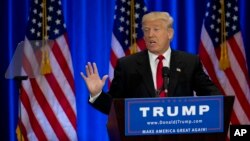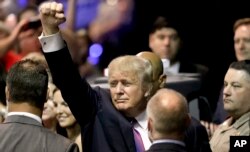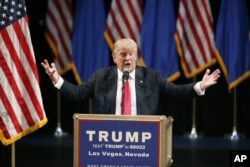When Talmage Pearce attends the Republican National Convention as a delegate next month, he is supposed to vote for Donald Trump.
Pearce is a Republican delegate from Arizona, which Trump won easily in a March primary election, capturing all 58 of the state’s delegates.
But Pearce, who works as an insurance agent in the central town of Mesa, said he “can’t vote for Trump in good conscience."
“I don’t believe any of the conservative positions he’s touted during the campaign are sincere,” Pearce told VOA.
He also takes issue with how Trump “insulted, blackmailed, and bullied” his opponents on his way toward the GOP nomination.
Republican delegates
Pearce is one of a number of Republican delegates nationwide who refuse to vote for Trump at the convention, despite being pledged to do so.
At this point, it’s not clear whether the delegate insurgency is widespread enough to deny Trump the majority of delegates he needs to clinch the nomination.
Currently, Trump has 1,542 delegates. He only needs to win 1,237 to get a majority. That means 306 delegates would have to revolt.
Some reports suggest hundreds of delegates have already joined the last-minute effort to oppose Trump at the convention. Others put that figure at only a few dozen.
In either case, the RNC faces a dilemma: how does it count the votes of delegates who, though pledged to Trump, refuse to vote for him?
Its response could determine whether the party splits. It could also undermine longstanding principles guiding the U.S. model of representative democracy.
At issue is a patchwork of state laws and party regulations that purport to require delegates to follow the will of primary voters in their state or district.
These laws vary widely by state. Some require delegates to be “bound” to a particular candidate only on the first round of voting. Others bind delegates for multiple rounds.
Laws obscure
The state laws are obscure. The truth is, no one has paid much attention to them over the years. That’s in part because no one has needed to — delegate voting at conventions is almost always a formality.
But the laws also were effectively neutralized by a series of decades-old rulings by the Supreme Court, which found it is unconstitutional for states to put legal restraints on private political parties.
“The enforceability of these [state] laws is doubtful,” said Bradley Smith, a former chairman of the Federal Election Commission. “The Supreme Court has made clear that a political party can have its own sorts of rules as to whether delegates have to vote in a particular way.”
Several other election law experts confirmed to VOA that the RNC has the right to determine whether to allow a delegate revolt, regardless of what state laws say.
“This one is for the party to decide,” said Heather Gerken, a professor who specializes in election and constitutional law at Yale Law School. “There is very little support for the claim that a delegate revolt would be illegal.”
So if the Republican Party has the legal authority to do as it chooses, what will it decide to do with delegates like Pearce, who vote their conscience in the first round, despite being pledged to Trump?
In an interview with VOA, a senior member of the RNC convention rules committee hinted that at least some of the “faithless” votes will, in fact, be counted against Trump.
The RNC already has decided that it will abide by some state laws: in certain states, all delegates will be bound to a particular candidate. That, the committee member said, is based on state laws and party rules, and cannot be changed.
“But the trouble is that some states are different,” he conceded. He did not elaborate on which states he was referring to.
If a revolting delegate comes from a state that does not have rules binding delegates to a certain candidate, however, how will the party treat that vote?
“It depends on the rules,” he said. “We’ll enforce the rules.”
Anti-Trump movement expands
That statement appears to leave the door open for Trump to lose at least some of his pledged delegates. Is it enough to deny him the nomination? No one knows.
As the convention draws closer, though, a diverse and influential range of figures within the Republican Party is working behind the scenes to make sure it is.
One of those figures is Curly Haugland, an unbound Republican delegate from North Dakota who is also a member of the convention rules committee.
Haugland is a controversial figure within the party. The RNC rules expert has for years tried to convince delegates they are all unbound and can vote for whoever they want.
He’s even co-authored a book, entitled Unbound: The Conscience of a Republican Delegate, that he is hoping to distribute to every GOP delegate before the convention.
In Haugland’s view, it is “simply a matter of fact” that GOP delegates are unbound.
Republican delegates, according to Haugland, are like a pen full of sheep. “In the RNC’s model, they’re all bound up by a fence. But the fact of the matter is, there is no fence,” he said.
RNC officials have repeatedly denied that Haugland’s theory has any legitimacy, but they could not be reached for comment on this story.
Free the Delegates
In recent weeks, another Republican group, called Free the Delegates, has sprung up in an effort to deprive Trump the nomination. Its strategy is related, but differs slightly, from Haugland’s.
The group is hoping to persuade the RNC rules committee, which meets a week before the convention, to pass a “conscience clause” that would formally change the rules to allow delegates to either abstain or vote for a non-Trump candidate.
For that to happen, 57 out of 112 members of the convention rules committee would need to agree to the clause. The proposal would then head to the convention floor, where it would have to be passed by a majority of delegates.
It’s not clear who an alternative candidate would be. No major candidate has emerged as the obvious choice.
Current RNC rules require the GOP nominee to have won at least eight states in the primary election process (although that rule also could change). As it stands now, Texas Senator Ted Cruz is the only candidate that would qualify.
Undermining democracy?
But if the party nominates anyone other than Trump, what would that mean for the future of U.S. democracy? Trump, though controversial, won 14 million votes. That’s more than any other Republican presidential primary candidate in history, and it’s not even close.
Does it mean the monthslong, state-by-state primary process, on which candidates spent hundreds of millions of dollars, was meaningless? A lot of Trump supporters think so.
“The idea that delegates are going to vote against the will of the people is absurd,” said Hildy Angius, a delegate from Mohave County, Arizona, who said she is glad to support Trump at the convention.
Another Arizona delegate, Lori Urban, says she’s also sticking by Trump. “If it’s 500 rounds, I am only voting Trump,” Urban told VOA by phone.
“Apparently people don’t listen to the will of the voters of this country, and therein lies the problem,” she said, before hanging up the phone abruptly.
Trump recourse
Trump himself has said that any delegate revolt would be “illegal.” Although that’s clearly not the case, according to most legal experts, he does have other options.
If the delegates deny Trump the nomination, his main recourse would be political rather than legal, according to Gregory Magarian, a constitutional law professor at the Washington University of Law.
For example, Trump could mount a third-party presidential run, riling up his supporters against the replacement GOP nominee, says Magarian.
“I doubt very much he cares about the electoral prospect of the GOP if he isn’t the nominee,” he said. “His records … [suggest] he would scorch the earth.”

















